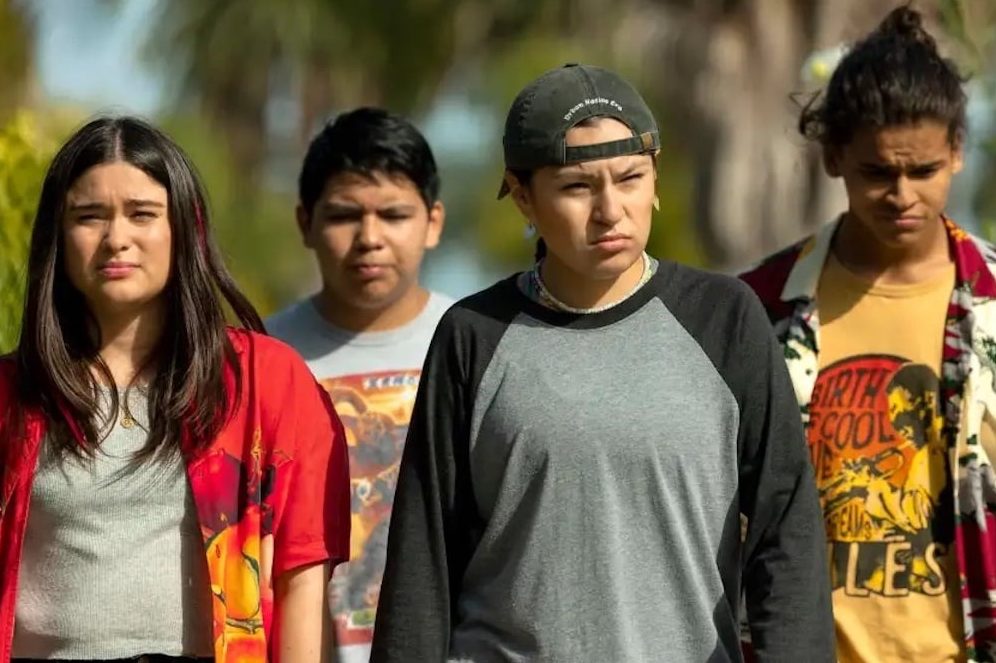Questions of fair and proportional representation of minority groups in the U.S. have occupied a huge portion of the collective discourse over the past decade, but Natives have often been left out of such conversations — which reflects a broader trend of media neglect. Reservation Dogs came into this gap in 2021. Co-created by Taika Waititi (Māori, also an executive producer), it’s the first U.S. TV show with an entirely Indigenous writing and directing lineup, along with a nearly all-Indigenous cast and crew.
The series follows the eponymous foursome of wannabe criminal teens living in the Muscogee Nation. Elora (Devery Jacobs, Mohawk) tends to end up as their leader by default of being the most level-headed. Bear (D’Pharaoh Woon-A-Tai, Oji-Cree) is an impulsive fuck-up who’s trying hard not to be, often chafing against his single mother’s attempts to steer him right. Tomboy Wille Jack’s (Paulina Alexis, Alexis Nakota Sioux) fun-loving and cheerfully foul-mouthed exterior masks a deep sense of grief and uncertainty about her direction in life. And sweet-natured Cheese (Lane Factor, Creek-Seminole and Caddo), who almost always introduces himself by stating his pronouns, does his best to keep the peace and stay upbeat. Bored out of their skulls in rural Oklahoma, the Rez Dogs dream of hustling enough money to leave for California.
Being a notable “first” in entertainment is a quality-agnostic descriptor; what’s more important is that, over the course of its run, Reservation Dogs has been a quietly powerful and unique series, striking a rare balance between realism and fantasy in handling its characters and stories. As the show kicks off its third and sadly final season, now is an excellent opportunity to catch up and keep up with one of the warmest, most humane works of U.S. television in years.
The show’s earlier episodes demonstrate a good deal of Waititi’s puckish gag stylings and dialogue — Bear repeatedly encounters an awkward “guardian spirit” who complains that his nipples are constantly stiff because the spirit world is so cold and he doesn’t wear a shirt. Soon, however, a more subtle comedic sensibility takes over as co-creator/showrunner Sterlin Harjo (Seminole and Muscogee) and the rest of the writing staff grow comfortable with their world. Many of the writers are also members of the all-Native comedy group the 1491s, and their shared dust-dry sense of humor proves a better fit for the series’ low-key atmosphere.
Harjo often directs, and other directors on the show include multiple Native up-and-comers from the independent festival circuit, including Sydney Freeland (Navajo) and Erica Tremblay (Seneca–Cayuga). Reservation Dogs thus lacks the overpolished sheen that’s far too common in contemporary television. Through innumerable details in everything from costuming to locations, it feels wholly lived-in. For every explicit line of dialogue, there’s a wealth of backstory left to be inferred for every character. Supernatural elements like ghosts or the Deer Lady of folklore easily coexist with this naturalism; Reservation Dogs is one of the few notable attempts at magical realism on TV.
That cast rapidly expands beyond the central group, and Reservation Dogs has built a portrait of its characters’ community whose depth and complexity belies the mere 18 episodes it’s had so far. There are no small roles here, with even incidental and one-scene characters getting humanizing moments and punchlines. The show also brings in a murderer’s row of Native character actors, ranging from Westworld and Fargo’s Zach McClarnon (Hunkpapa) and Prey’s Amber Midthunder (Fort Peck Sioux) as an airheaded influencer activist in what’s probably the funniest episode, to the great Wes Studi (Cherokee Nation) as an artist with a questionable grasp of string theory. I was thrilled by the unexpected but entirely welcome appearance of Lily Gladstone (Blackfeet and Nimíipuu, soon to be seen in Martin Scorsese’s Killers of the Flower Moon) as Willie Jack’s incarcerated medicine woman aunt.
“Killers of the Flower Moon,” “May December” and American Myth-Making Dominate Cannes
The new films from Martin Scorsese and Todd Haynes are the highlights of the festival so farGladstone’s character is also the mother of Daniel, an erstwhile Rez Dog who died by suicide a year prior to the events of the series. Seen occasionally in flashbacks or visions, Daniel is a structuring absence for Reservation Dogs, with the kids’ lingering grief over losing him implicitly motivating a good deal of their actions. It was originally Daniel’s dream to leave the reservation for California. It’s this kind of specificity and intensity that lends emotional weight to what on paper could read as a generic aspiration for the leads. That specificity runs through the whole show. It addresses social issues that plague Native communities — poverty, substance abuse, suicide — with a careful, deft touch, succumbing to neither grimness in its drama nor glibness in its comedy.
Amid the glut of “content” offered by so many different streaming services and networks, it’s easier than ever for a good series to quietly run without stirring too much conversation. Reservation Dogs is one of the greatest of these programs, part of the confusingly branded FX on Hulu slate — shows produced under the umbrella of the respected cable network but which for some reason go straight to streaming on Hulu rather than actually air on the network. The show has received critical acclaim since it started, but without much corresponding affection from awards bodies or social media buzz. Still, it has at least done well enough to earn multiple renewals, and it appears to be going out now on its own terms, with Harjo affirming that the decision to end things lay with the creative team and producers. Reservation Dogs will be sorely missed by anyone fortunate enough to discover it, but there’s something to be said for taking a bow at one’s creative crest.
This article was featured in the InsideHook newsletter. Sign up now.
